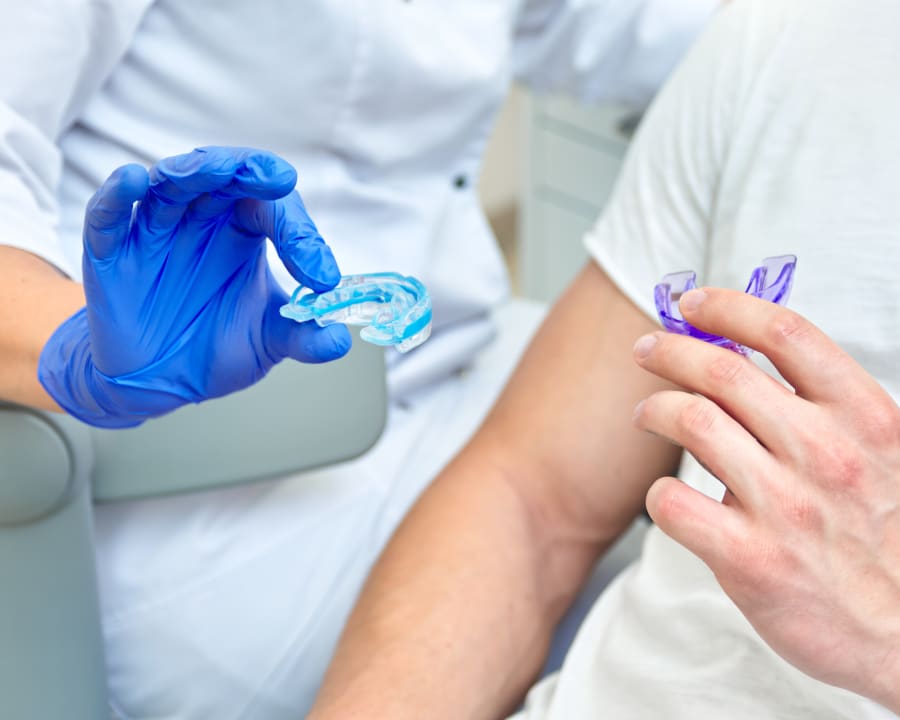
Protect Your Teeth From Injury
Every year, many dedicated athletes are sidelined with injuries to the mouth. Fortunately, a custom-made sports mouth guard can prevent many of these by protecting your teeth, gums, tongue and tissues from serious cuts or abrasions if you take a hit to the face.
A sports mouth guard provides a firm barrier that acts as a cushion between your teeth and the soft tissue of your mouth. It protects your smile from impact during sports, such as football or hockey.
Our sports mouth guards are made specifically to fit over your teeth, so the force of the impact gets redistributed if you are hit in the mouth.
Mouth guards protect your face, head, teeth and jaw from injuries such as chipped teeth or bitten lips while you focus on what's happening on the court or ice rink.
How Sports Mouth Guards Are Made
After your dentist takes precise digital impressions and measurements of your upper teeth, these will be sent to a dental lab so your sports mouth guard can be created to exact specifications.
These specifications are important, since they determine how snugly your mouth guard will fit - and how effectively it will protect your teeth while allowing you to breathe and remaining comfortable to wear, game after game.
Unlike mass-produced stock or boil and bite mouthguards, this custom-fitted dental appliance is made to fit your individual mouth.
A plaster mold is created from the impression before dental-grade plastic mouth guard material is heated and pressure formed to the plaster mold. This creates a mouth guard that will protect your teeth, roots and gums from severe injury.
Sports Mouth Guard FAQs
Here are some frequently asked questions our dentists at Life Dental have received about sports mouth guards:
-
What is the difference between stock mouth guards and custom-made mouth guards?
While you can purchase stock mouth guards or boil-and-bite mouth guards at sporting goods stores, visiting your dentist in New Westminster to get fitted for a custom-made sports mouth guard is worth your time and investment.
Stock mouth guards and boil-and-bite mouth guards are not made to fit your specific teeth, so may fit more loosely than a custom-made sports mouth guard designed to specifically fit your smile. Fit is important when it comes to impact, as the better your mouth guard fits, the better it will be able to redistribute the force of a sudden hit to the mouth.
-
How will I know whether my mouth guard is effective?
Here are some questions to ask yourself to help determine if your sports mouth guard can effectively protect your teeth while providing comfort:
- Does the mouth guard fit comfortably?
- Is there enough coverage, thickness and protection in key areas?
- Does it allow for natural breathing?
- Is the mouth guard resistant to wear and tear?
- Is the mouth guard odourless and tasteless?
- Does the mouth guard retain its form?
-
Are custom-made sports mouth guards costly?
While you can expect to pay more for a custom-made sports mouth guard than a stock mouth guard or boil-and-bite mouth guard, we believe the investment is worth it.
Consider the cost in potential dental work and emergencies you'll save over time, along with the time and aggravation of recovery and the possibility of being sidelined, due to having a sports mouth guard that provides protection to your teeth, mouth, gums and tissues.
-
How should I care for my mouth guard?
Taking good care of your mouth guard can prolong its life and ensure it effectively protects your mouth from injury for as long as possible.
Here are some tips to care for your mouth guard:
Cleaning - Use a toothbrush and toothpaste to clean your mouth guard before and after each use. This will remove bacteria and keep your dental appliance fresh and clean.
Rinsing - Use soap and lukewarm water to clean and rinse your mouth guard periodically. This will help remove debris and bacteria.
Storage - Store your mouth guard in a firm case when you're not using it. This can protect it from being crushed or broken.
Replace - Eventually, your custom-made mouth guard will need to be replaced after its ability to protect your teeth has been compromised through wear and tear. Carefully monitor the condition of your dental appliance and ask your dentist when it's time to get a new one.
